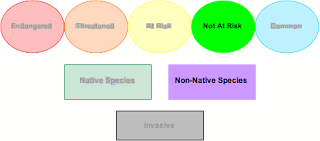Saturday, June 30, 2012
The unknown Draba
Species name: Draba sp.
Common name: whitlow-grasses
Location: Ontario
This is a prime example of "stump the botanist". First, I didn't take great pictures of this plant (I'll be the first to admit it!). Second, it's not in full flower anymore so I can't go back and take better ones. Third, I managed to narrow it down to a genus of plants with over 400 species. Fourth, mustards are notoriously difficult to identify when they're "non-native, yellow-flowered, small-ish plants with ovate leaves." If anyone has a suggestion to species names, I'm all for hearing them. The best I've got is something like Draba crassifolia or Draba graminea.
So what's notable about these plants? Well, they're all in the mustard family which is actually an enormous family of plants, all with small yellow or white flowers that have four petals. The non-showy species are native to North America, Asia and Europe, and the showy species with either larger or brighter-coloured flowers are native to Central and South America. I can say with pretty good confidence that this species is non-native, since our two most common native Draba species have white flowers. Out of the 400+ species in the genus, many of them are endemic to very small pockets in the world, with a significant number (30-ish) of those being found only in Ecuador. There are also 3 or 4 species that are endemic to locations in the Colorado mountains in the southwestern United States. All of these endemic species are at a very real risk of going extinct since their population numbers are so small.
This group of plants is also somewhat closely related to rapeseed, also called Canola in Canada (which is actually an acronym; it stands for Canada Oil Low Acid), which is an immensely important oil crop in the Prairie Provinces. Every time you eat canola-based margarine you're eating a genetically modified crop! Wild rapeseed is incredibly bitter and if you consume enough of the extracted oil it can burn the inside of your mouth and digestive tract. It was modified through selective breeding and modern biotechnological methods to lower the acid content in the seeds so it is a more practical source of edible oil.
Subscribe to:
Post Comments (Atom)



No comments:
Post a Comment